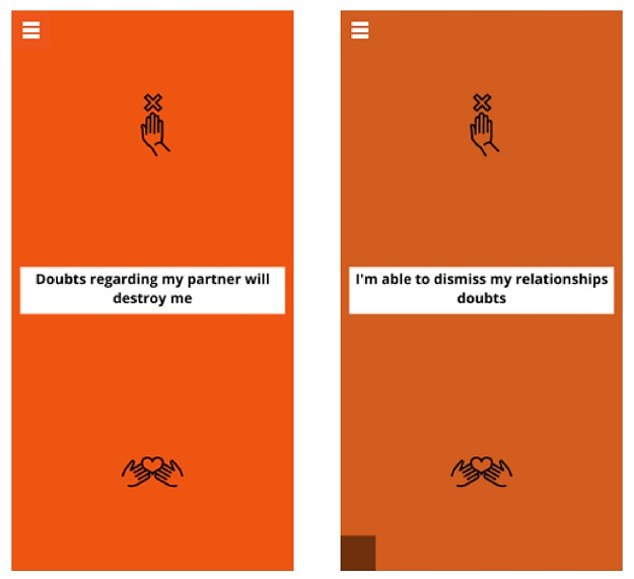Do you have ROCD? The little-known condition psychologists say could be ruining your relationship without you even knowing
Obsessively washing hands, checking whether doors are locked and hoarding are common symptoms of obsessive-compulsive disorder.
But a specific but lesser-known form of OCD could derail your relationship, psychologists say.
People struggling with obsessive-compulsive disorder (ROCD) may put their own marriage aside or become obsessed with their partner’s perceived shortcomings.
However, a team of researchers from Israel now believe that a simple mobile app can alleviate the symptoms of the condition.
People with ROCD may have difficulty maintaining a healthy relationship. Patients often worry about whether they are in the “right” relationship, about the intensity of their feelings toward their partner, and how their partner thinks about them.
Healthy romantic relationships can boost mental and physical health, well-being and self-esteem, the researchers noted.
However, people with ROCD may have difficulty maintaining one.
Patients often worry about whether they are in the “right” relationship, about the intensity of their feelings toward their partner, and how their partner thinks about them.
Alternatively, people with ROCD may suffer from doubts and preoccupations about their partner’s perceived shortcomings, such as their appearance and intelligence.
This can cause patients to become preoccupied with thoughts such as whether their partner is funny enough, pictures, such as one of their partners looking unattractive, and urges to leave their partner.
As with other forms of OCD, these intrusive experiences are “unwanted and often unexpected,” the researchers said.
ROCD symptoms have been linked to poor sexual satisfaction, low levels of commitment, insecure attachment and excessive jealousy, the team said.
Cognitive behavioral therapy – a form of talk therapy – is the main treatment.
However, the researchers from Reichman University in Israel investigated whether a phone app could protect against ROCD symptoms.
They recruited 103 heterosexual couples, on average 26 years old.
Half were asked to use the app daily. It involves sifting through behaviors associated with ROCD, similar to profiles on a dating app, and categorizing them as good or bad.
For example, the app would display a statement like “doubting my partner will destroy me,” which should be swiped up, as if the thought were being “thrown away,” researchers said.

For example, the app would display a statement like “doubting my partner will destroy me,” which should be swiped up, as if the thought were being “thrown away,” researchers said. Another statement, “I am able to dismiss my relationship doubts,” should be swept down as if you were “embracing” the concept
Another statement, “I am able to dismiss my relationship doubts,” should be swept down, as if the concept is “embraced.”
Participants were asked about their relationship and sexual satisfaction, the prevalence of OCD and RCOD symptoms, and their mental health at the start of the study, after using the app and one month later.
Results, published in the journal Heliyonshowed that those who did not use the app saw their OCD and ROCD scores increase, while those who used the app “reported no such increase.”
The researchers said the app “was not associated with symptom reduction, but rather protected against the increase in symptoms seen in the control group.”
They suggested that the findings could be due to those not using the app suffering from ROCD behavior during stressful periods.
Meanwhile, those who used it are now better able to control ROCD behavior during periods of stress, they argued.
